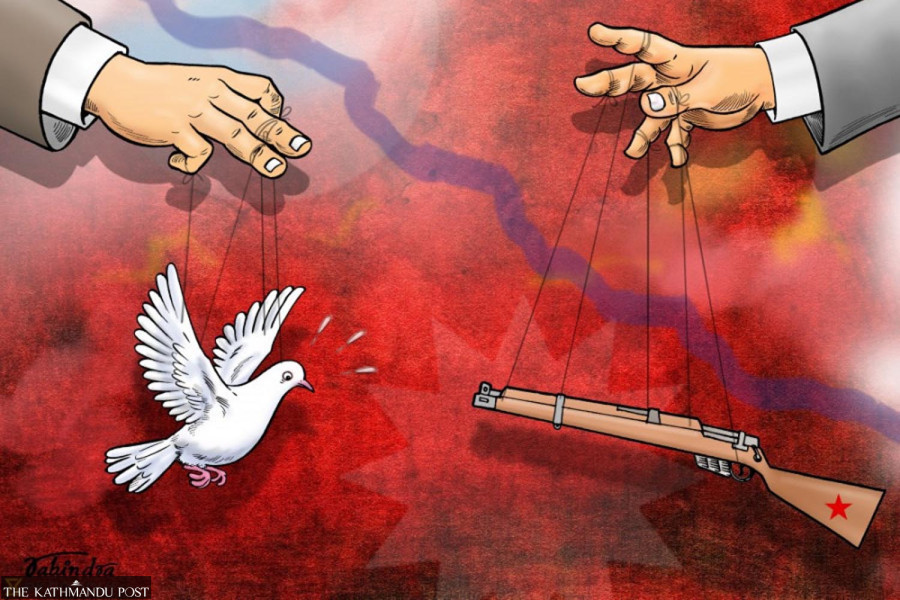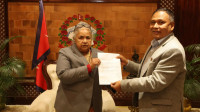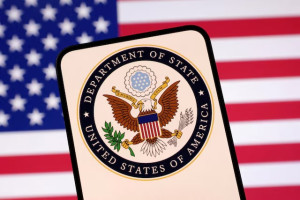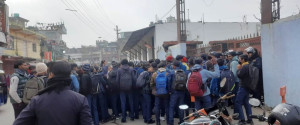National
Parties regularly mention transitional justice in manifesto but progress dismal
Conflict victims say they are fed up with unfulfilled promises.
Binod Ghimire
Conclusion of the transitional justice process with an immediate effect was one of the major points in the Comprehensive Peace Accord signed between the government and the revolutionary CPN (Maoist) in 2006.
For the last 16 years, the parties have been making public commitments to concluding the process without delay. Such pledges are repeated ahead of the elections or while forming a new government. The upcoming federal and provincial assembly elections are no exception.
Concluding the remaining task of transitional justice is the commitment of all major parties expressed through their election manifestos. The CPN-UML manifesto has listed completing the remaining tasks of the peace process and transitional justice among the 20 of its major assurances.
It has said the party will provide medical treatment, employment, self-employment opportunities and rehabilitation to the injured and those disabled by the insurgency. “There will be compensation, rehabilitation and reparations to the insurgency victim families in addition to the assurance of justice and protection to the victims,” reads a pledge from its manifesto.
Similarly, the CPN (Maoist Centre) has listed transitional justice as one of three major tasks of the peace process. The integration of former Maoist combatants in security forces and promulgation of a new constitution that were parts of the peace process have been completed, but the peace process is still inconclusive as the transitional justice process remains incomplete, according to its manifesto.
“The entire peace process will conclude once the Truth and Reconciliation Commission and the Commission of Investigation on Enforced Disappeared Persons complete their works,” says the manifesto. “Due priority will be given to concluding the transitional justice process with a focus on national reconciliation, bringing sustainable peace, and delivering justice to the victims.”
While the manifestos of the UML and the Maoist Centre have dedicated a couple of paragraphs to transitional justice, the ruling Nepali Congress has summed up the issue in just one sentence. The Congress manifesto says, “Completing the remaining tasks of transitional justice in line with the Comprehensive Peace Accord” is one of its priorities.
The three parties have been leading the government by turns since the peace deal. However, other than forming two commissions—the Truth and Reconciliation Commission and the Commission of the Investigation on Enforced Disappeared Persons—nothing tangible has been done towards providing justice to the thousands of victims from the insurgency that lasted for a decade from 1996.
Human rights activists say it is good that the parties have not forgotten the issue, however, the commitments on paper make no sense unless they get translated into actions. They say given the track record of the parties, it is hard to believe the commitments made in their election manifestos.
Charan Prasai, a human rights activist, says if the parties were even bothered a little about the victims, they would have amended the Enforced Disappearance Enquiry, Truth and Reconciliation Act, 2014.
The Supreme Court in February 2015 had directed the government to revise the amnesty provisions in the Enforced Disappearances Enquiry, Truth and Reconciliation Commission Act, 2014 in compliance with international principles and Nepal’s international obligations to human rights. However, close to eight years since the verdict, successive governments have done a little to amend the Act.
“Transitional justice has always found a place in the manifestos before every election, but when the parties reach to power they have been ignoring the topic. “This is just a strategy to appease the victims during elections,” Charan Prasai, a human rights activist, told the Post. “We have been seeing that no party is committed to providing justice to the victims.” He says the politicisation in the formation of the two commissions have killed the hopes that the parties would work towards providing justice to the victims.
The truth commission has received 63,792 complaints since its formation in February 2015. Similarly, the disappearance commission has received 3,223 complaints of enforced disappearances at the hands of state security forces and the Maoists. After a preliminary investigation, the commission has identified 2,484 cases as genuine although the International Committee of the Red Cross says 1,333 people are still missing in connection with the armed conflict.
Other than conducting preliminary investigation in some of the complaints, there has been no progress towards providing justice to the victims. In the view of conflict victims, they are fed up with the unfulfilled promises. They say they have little hope that the parties will implement their pledges made in election manifestos. “These parties have always cheated the victims. They have always used us as vote banks in every election,” Janak Raut, a former general secretary of the Conflict Victims Common Platform, told the Post. “Their past deeds give no room for us to be hopeful.”




 5.83°C Kathmandu
5.83°C Kathmandu








%20(1).jpg&w=300&height=200)





